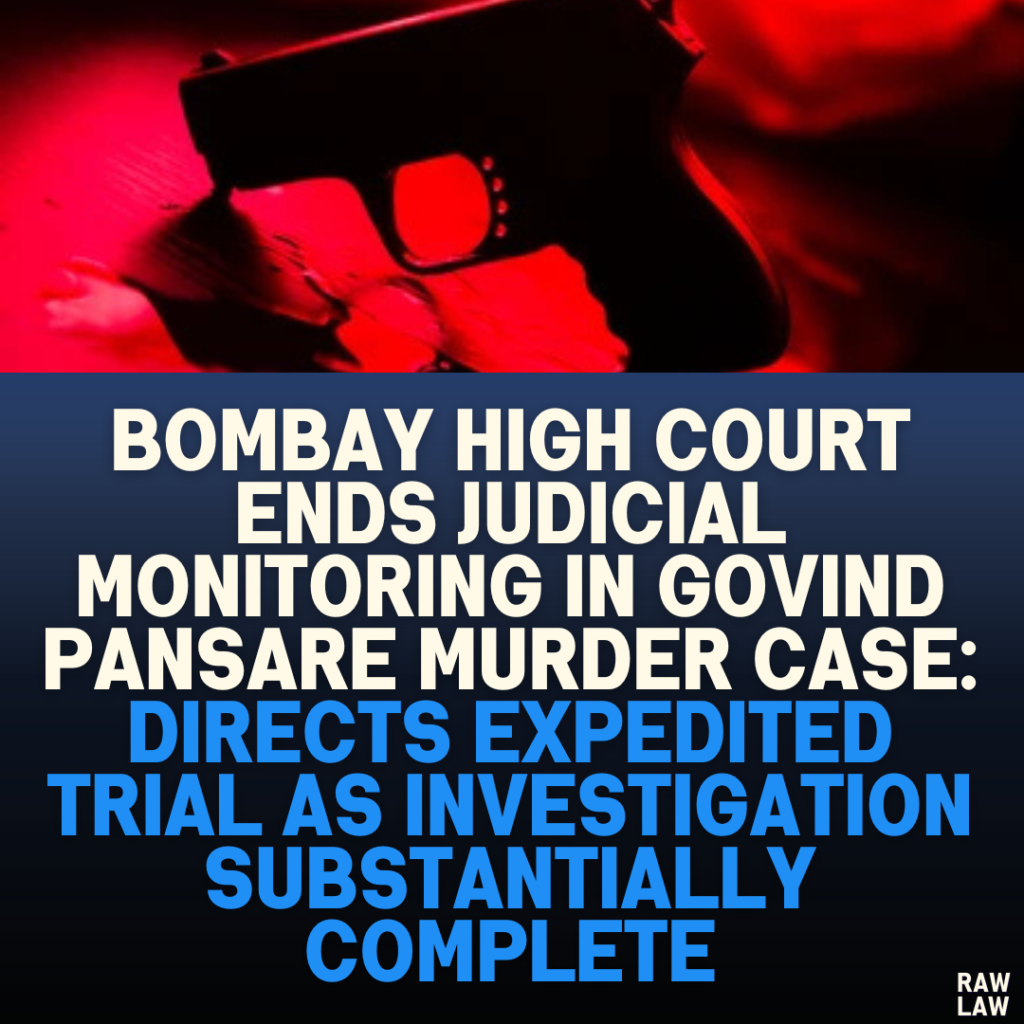Court’s Decision
The Bombay High Court dismissed the petition for continued judicial monitoring of the investigation into the 2015 murder of activist Govind Pansare. The Court concluded that the investigation, barring the arrest of two absconding accused, was substantially complete. It directed the trial court to expedite the hearing of the case by conducting daily hearings to ensure timely justice.
Facts of the Case
- The Crime: Govind Pansare, a well-known activist, and his wife were shot by two unidentified assailants near their residence in Kolhapur in February 2015. Pansare succumbed to his injuries four days later.
- Initial Investigation: The case was initially handled by the Rajarampuri Police Station and later transferred to a Special Investigation Team (SIT).
- Subsequent Developments: Under court directions, the Maharashtra Anti-Terrorism Squad (ATS) took over the investigation in August 2022. Despite these measures, two prime suspects—Vinay B. Pawar and Sarang D. Akolkar—remain at large.
- Petitioners’ Concerns: Pansare’s family members filed a petition claiming that both the SIT and ATS failed to achieve significant progress. They argued that court supervision was crucial for justice.
Issues Before the Court
- Whether continued judicial monitoring of the investigation is necessary to ensure justice in the Pansare murder case.
- Whether the trial court should expedite hearings to avoid undue delay.
Petitioner’s Arguments
- Need for Judicial Monitoring: The petitioners contended that monitoring was essential to ensure the arrest of the absconding accused and uncover the broader conspiracy. They alleged that the masterminds behind Pansare’s murder were also linked to the killings of Dr. Narendra Dabholkar, Prof. M.M. Kalburgi, and Gauri Lankesh.
- Tardy Progress: They highlighted that the SIT had failed to make significant breakthroughs, necessitating the ATS’s involvement, which, despite some progress, still fell short.
- Conspiracy Angle: They argued that the nexus between these high-profile cases was not thoroughly investigated, justifying the need for continued court oversight.
Respondent’s Arguments
- Completion of Investigation: The State, represented by the ATS, asserted that the investigation was substantially complete, except for the arrest of two absconding accused. A sealed report was submitted detailing the progress.
- Ongoing Efforts: The ATS emphasized its continued efforts to locate and apprehend the absconding suspects. It argued that monitoring by the Court was no longer necessary.
- Trial Progress: The State pointed out that the trial had commenced, with 28 witnesses already examined, and assured the Court of its commitment to ensuring a fair trial.
Analysis of the Law
- Judicial Monitoring: Referring to Vineet Narain v. Union of India (1998), the Court reiterated that judicial monitoring of investigations concludes once a charge sheet is filed and the matter transitions to trial.
- Role of Trial Courts: In Sushila Devi v. State of Rajasthan (2014), the Supreme Court clarified that continued judicial monitoring during the trial phase undermines the ordinary legal process. The focus should shift to the trial court for further proceedings.
- Precedents Applied: The Court also cited Shahid Balwa v. Union of India (2014), which held that trial courts should take over once investigations are completed.
Precedent Analysis
- Vineet Narain Case: The Supreme Court held that judicial monitoring ends with the filing of a charge sheet, ensuring the judicial process does not intrude into executive functions.
- Sushila Devi Case: The Court emphasized the need to respect the trial court’s autonomy post-investigation.
- Shahid Balwa Case: Reinforced that trial courts are best equipped to handle cases once they are at the prosecution stage.
Court’s Reasoning
- Sufficiency of Investigation: The Court noted that the ATS had investigated all angles of the case, including allegations of broader conspiracies. The pending arrests of the two absconding accused, while significant, did not justify continued monitoring.
- Progress in Trial: With 28 witnesses examined, the trial had already made substantial progress. The Court deemed it inappropriate to delay proceedings further by maintaining oversight.
- Judicial Economy: Citing Supreme Court precedents, the Court underscored that prolonged judicial monitoring post-investigation disrupts the balance between the judiciary’s oversight role and the prosecution’s responsibilities.
Conclusion
The Bombay High Court concluded that further judicial monitoring was unwarranted. It directed the trial court to expedite the hearing of the Sessions Case No. 3 of 2016 on a daily basis to ensure swift justice. All related interim applications were disposed of accordingly.
Implications
- Judicial Oversight Limits: The judgment reaffirms the principle that judicial monitoring of investigations should not extend into the trial phase, preserving the separation of powers.
- Expedited Justice: The Court’s directive for daily hearings underscores the judiciary’s commitment to timely justice, particularly in high-profile cases.
- Focus on Efficiency: The decision emphasizes the importance of allowing trial courts to function independently without external oversight once investigations are substantially complete.
This detailed explanation outlines the case’s facts, legal principles, and the Court’s rationale, ensuring a comprehensive understanding.




Pingback: Supreme Court Grants Anticipatory Bail in Section 306 IPC Case: Highlights Lack of Need for Custodial Interrogation and Appellant’s Cooperation with Investigation - Raw Law